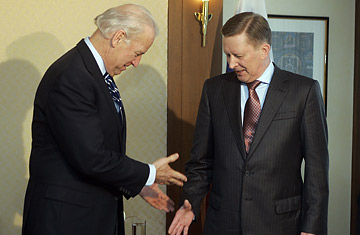
U.S. Vice President Joe Biden, left, meets Russian Deputy Prime Minister Sergei Ivanov during the International Conference on Security Policy in Munich
Europe was always likely to welcome Barack Obama's message on foreign policy, if only because the new President's conciliatory tone represents a fresh approach by Washington. Speaking at the high-powered Munich Security Conference this weekend, Vice President Joe Biden sent all the right signals on consultation and cooperation with European allies. But beyond sighs of relief at the changing of the guard, the European leaders at Munich still seemed unsure of what they actually want from Washington on a wide range of global security issues.
Biden, unveiling the broad contours of Obama's new foreign policy framework, made clear that the cost to Europe for a greater share in the decision-making would be a willingness to shoulder a greater share of the burden. While pledging to abide by international rules, fight climate change, engage with the Islamic world and "press the reset button" with Russia, Biden warned that Washington would also expect changes from Europe. "America will do more. That's the good news," he said. "The bad news is that America will ask for more from our partners as well." (See pictures of Russia celebrating Victory Day.)
The new tone is all very well, but if Obama does follow through on Biden's promise to "sincerely" listen to Europe, he is likely to hear a cacophony of confusion. For Europe — be it the European Union or the European members of NATO — has no clear consensus on strategic priorities or how they should be pursued. That applies to challenges from Afghanistan and Guantánamo to Iran and Russia. The Obama Administration may want to cast aside the hawkish unilateralism of the Bush era and its divide-and-rule methods that so jarred European sensitivities. But as the new President will quickly find, Europe is quite capable of dividing itself without outside help.
That's evident in the debate about troop levels in Afghanistan. Almost half of NATO's 55,000 troops in Afghanistan are American, and Obama plans to almost double the U.S. military presence, although he says the emphasis will be on a "new realism" in objectives. Biden said the U.S. will come up with a new strategy in the next few months and has invited suggestions from all friends and allies. (See pictures of Joe Biden.)
But while Britain and the Netherlands have troops on the frontline, other allies insist that reconstruction is as important as combat and refuse to redeploy. Speaking yesterday in Munich, British Defense Secretary John Hutton scolded his NATO allies for not stepping forward to share combat duties, warning that there could be no freeloaders in the fight against the insurgents. "It is better to volunteer than to be asked," he said, denouncing the European habit of "looking to the Americans to do all the heavy lifting."
Yet French President Nicolas Sarkozy and German Chancellor Angela Merkel, also at the Munich conference, were silent on whether they would offer more troops. German Defense Minister Franz-Josef Jung told the conference that the priority in Afghanistan should be civic support. "We will not win by military means alone," he said. "There can be no development without security, but there can be no security without development either."
Michael Emerson, associate senior research fellow at the Brussels-based Centre for European Policy Studies, says Europe's hesitation stems from the general skepticism that the Afghan policy is on the right track. "We are at a moment of truth on what the real strategy is on Afghanistan," Emerson says. "If the question is, Can Obama get a blank check?, the answer is no." Emerson also warns that Europe's own resources are limited. "It is absolutely clear that some European countries are pathetically organized in terms of deployment, and that is a major problem," he says.
Richard Holbrooke, Obama's new envoy to Afghanistan, acknowledged this reluctance when he said the U.S. "inherited a situation of very grand rhetoric with inadequate, insufficient resources." At the same time, NATO Secretary-General Jaap de Hoop Scheffer cajoled Europe not to rule out more troops. "That is not good for the political balance of this mission," he said. "If Europe wants a greater voice, it needs to do more."
Nonetheless, there is still hope that Biden's promise to listen marks a change in itself. Ulrike Guérot, of the European Council of Foreign Relations in Berlin, says that by merely pressing the reset button — and not just on Russia — the U.S. could expect Europe both to engage and to develop its own strategic priorities. "Europe will be reluctant to always say yes — and we have different approaches, with some going for more military solutions, some more aid," she says. "But just by embracing Europe as a partner, [the U.S.] will help European countries deliver common answers, and that will be mutually reinforcing for the relationship."
